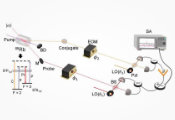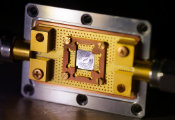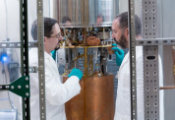Heriot-Watt University Breaks Ground on New £2.5M Optical Ground Station
August 28, 2024 -- Work has started on a new Quantum Communications Hub Optical Ground Station (HOGS), a state-of-the-art telescope which is being built on Heriot-Watt University’s Research Park.
The new facility will demonstrate and test satellite quantum secure communications, maintaining and growing the UK’s strength in the field of quantum technologies. It is scheduled to be fully operational by late Autumn [2024].
As well as helping to tackle future cyberattacks by researching methods to send secure transmissions via satellites, it will unlock new research on space environmentalism alongside innovative R&D activities for future laser communication networks. These provide high bandwidth communications services like 6G and beyond.
The facility will feature a plethora of cameras, sensors, and other photonic technologies enabling HOGS to expand how it can be used for both UK-based and international researchers and industry contacts. HOGS will also be directly connected to a new University campus optical fibre network, being developed alongside HOGS, allowing innovative teams to demonstrate deployment of optical, quantum, and hybrid communication networks.
The facility is being built as part of the Quantum Communications Hub project, funded through the UK National Quantum Technologies Programme and is part of a collaborative effort which also involves the Universities of Bristol, Strathclyde, and York. Space engineering expertise is provided by the Science and Technology Facilities Council’s RAL Space Facility.
Other UK researchers with relevant interests in experimental satellite quantum communications will be invited to work onsite using the modern telescope to track satellite paths with high precision. Heriot-Watt students, from undergraduate to PhD, will benefit from the new capabilities while local school children will be hosted onsite to build their knowledge and understanding of satellite communications and astronomy.
Dr Ross Donaldson from Heriot-Watt University is leading the project. He said: “We want to show that UK scientists have the capabilities to deliver satellite quantum-based communications and have the expertise to do all the required operations. Creating secure global connectivity is the goal and we look forward to demonstrating our abilities once the Optical Ground Station is up and running.
“This new facility will provide UK and international teams with the opportunity to trial new techniques and technologies for innovative R&D as well as space environmentalism. Our high latitude location offers us the chance to track space junk and debris in polar orbits for long periods of time, which may allow us to identify smaller objects.”
Professor Tim Spiller, director of the Quantum Communications Hub, said: “Satellites will form an essential part of future worldwide quantum communications, and in-orbit demonstrator missions are essential in proving the UK’s capabilities as a leader in secure quantum communications. The ground-based receiver is clearly a key element of any mission, and we look forward to the Hub Optical Ground Station becoming operational at Heriot-Watt University.”
Heriot-Watt University has world leading expertise in quantum communications and associated technologies behind it. The new HOGS facility represents a major step towards creating a ‘space cluster’ on the institution’s Edinburgh campus.




































